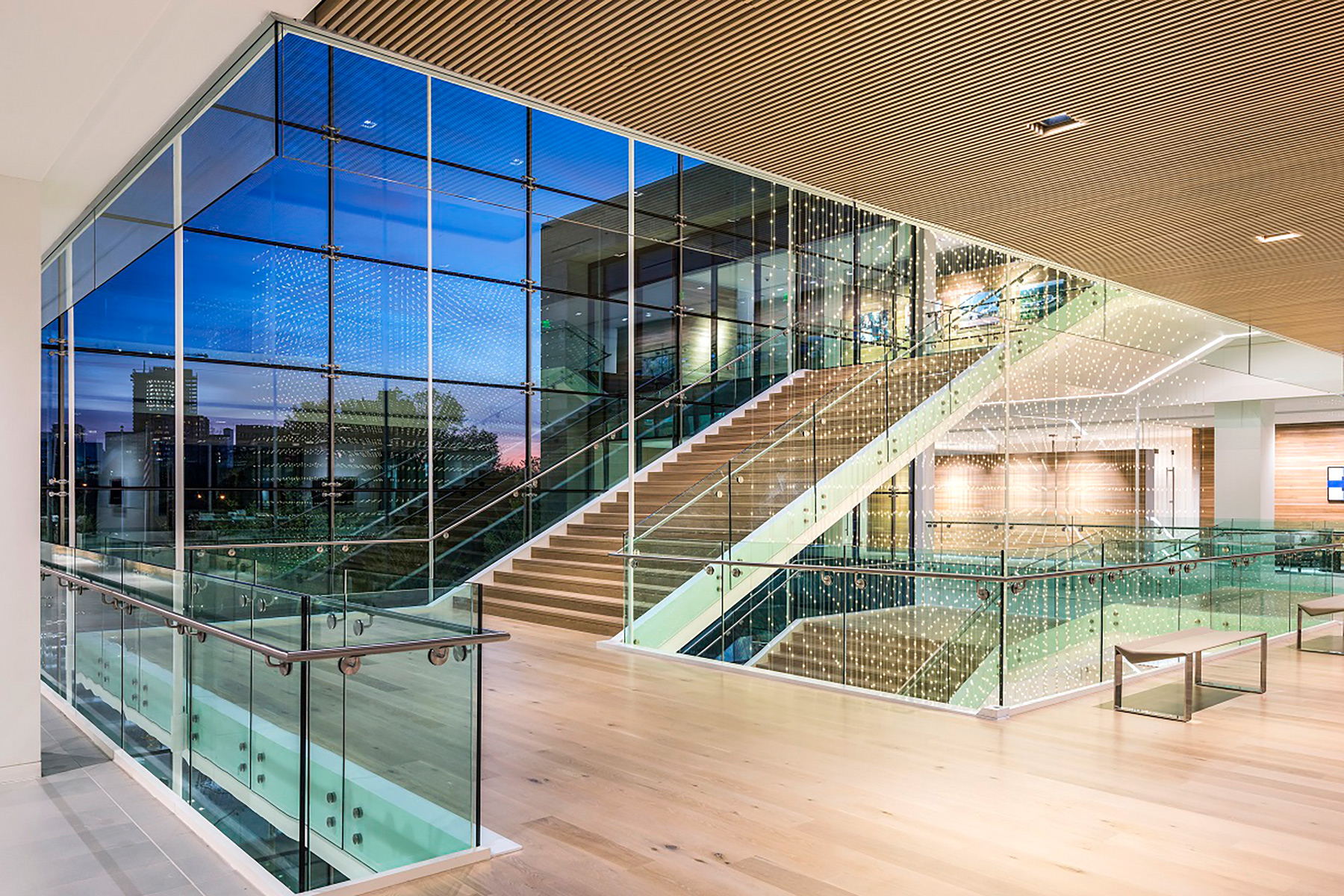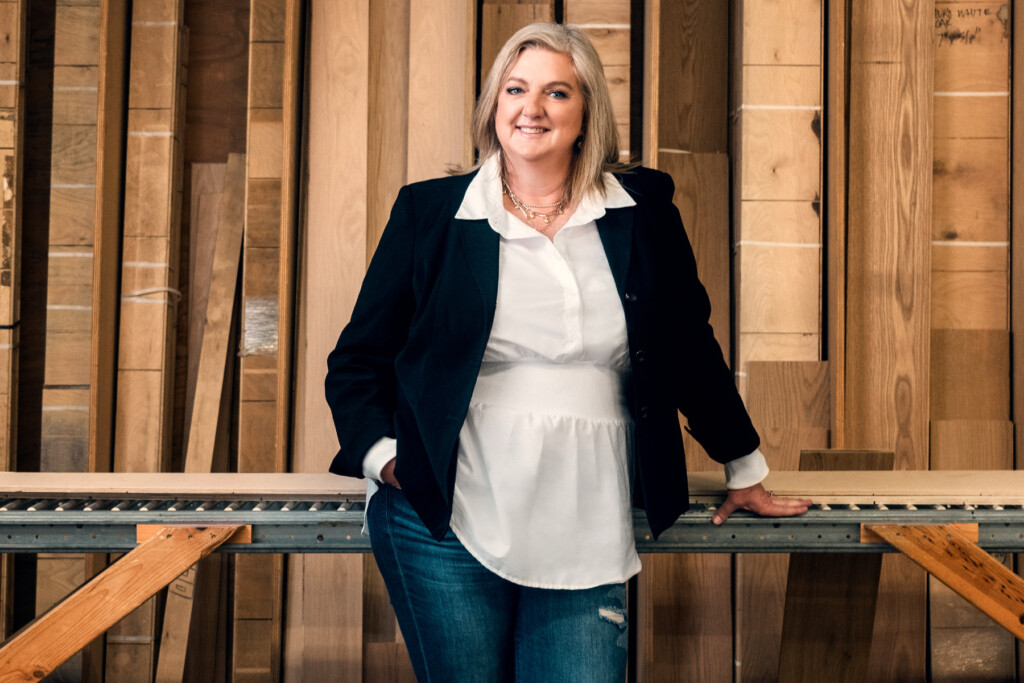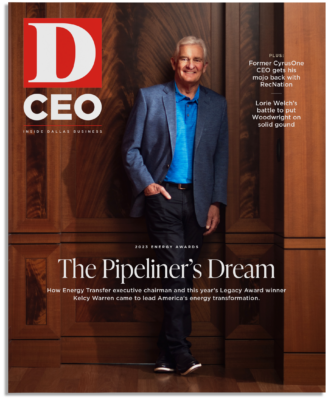Over the past seven years, Lorie Welch has been learning nearly everything there is to know about coming to stand on solid ground—literally and figuratively. She’s the CEO of Woodwright Hardwood Floor Co., a role she’s held since 2016 when her husband, Steve, unexpectedly died after a quick and painful battle with throat cancer.
You can find her company’s work across the floors—and sometimes walls, ceilings, and other creative installations—of Dallas-Fort Worth’s corporate offices, residential developments, hotels, higher education campuses, stadiums, civic buildings, museums, healthcare facilities, performing arts venues, and more. Woodwright works closely with design firms such as Gensler, Corgan, and The Beck Group and is responsible for most of the flooring in Old Parkland, including more than 25 intricate, handmade medallions. Other clients have included Keurig Dr Pepper, Toyota Music Factory, and The Kimball Art Museum in Fort Worth.
When Welch took over the company that her late husband and his uncle, Tom Peterson, founded in a garage in 1985, she faced a big challenge: Could she keep clients and win new contracts from skeptical architects and general contractors who were unsure how the homeschool mom-turned-CEO would fare?
Welch met her late husband, Steve, in 1996 while she was working at a furniture store in Addison. He was recently divorced and had kept his house but none of its furnishings. He didn’t buy anything that day, but he did invite Welch to dinner at a nearby T.G.I. Friday’s. As they got to know each other, Welch saw Steve’s passion for his business and deep knowledge of various wood species and constructing floors. She describes him as “nerdy, in a cool way,” with a proclivity to talk about wood and its material intricacies at length.
The couple married in 1998. By then, Steve, who had bought out his uncle’s interest and owned the company outright, had become a well-established name in the commercial flooring industry. Welch spent most of her time with their two children—a son, Ransom, and a daughter, Copeland—on the family’s ranch in Aquilla, about 90 miles outside of Dallas.
Somewhere along the way, Steve found a best friend in Spike Cutler, whom he met through his insurance agent when Cutler was a young construction attorney. Now, with a three-decade tenure, Cutler represents commercial construction contractors like Woodwright.
In building his company, Cutler says, Steve worked to differentiate Woodwright and deliver a perfectionist’s vision of top-tier service. He brought most manufacturing functions in-house, and if he couldn’t buy equipment to complete a creative installation, Steve would have it built or build it himself.
Cutler remembers a few Woodwright “inventions,’’ such as its pioneering use of mesquite wood as a hardwood flooring material, one of the first laser cutters he’d seen, and some kind of machine with “like 15 hydraulic rams in a row” to achieve a sandwiching effect.
“The bottom line is, it was a culture of both innovation and quality,” Cutler says. “There was nobody as good as Steve, and he was often consulted by people from around the world on special design problems to find innovative approaches and get stuff done.”
Under Steve’s leadership, Woodwright completed high-profile flooring projects across North Texas at the Winspear Opera House, the Tobin Center for the Performing Arts, the Kimbell Art Museum, and the George W. Bush Presidential Library, to name just a few. In 2009 and 2015, the company won the prestigious National Wood Flooring Association’s “Wood Floor of the Year” award.
When Steve died on Jan. 26, 2016, his family, friends, clients, and community members were shocked. “Steve was one of my very best friends in the world,” Cutler says. “It was a gut blow when we lost him.”

Holding the Floor
The morning after Steve passed, Lorie held a crisis meeting at her parents’ home in Aquilla, next to where she and Steve lived. Cutler and James Colten, Steve’s right-hand man who is now Woodwright’s chief operating officer, were still in shock. “The challenge was that the company was so tightly associated with Steve, and we had one shot to present to the world that Steve was gone before the world found out itself,” Cutler says.
The team wrote a statement and pulled together a list of priority customers—general contractors and architects that Woodwright relied heavily upon for business. Colten quickly hit the road, driving to meet face-to-face with many of its key general contractors. The message was this: Steve was gone, but Lorie was committed to Woodwright. The company would carry on. Its team was fully intact, and it was financially solid. There was no loss of drive, direction, or quality.
In the meantime, Welch was, as Cutler puts it, “making damn sure that was the case.” Within 48 hours, her role quickly shifted to that of Woodwright’s new leader, and the stigma of being the wife in over her head became a real thing. She was scared. “Steve was the innovator, always coming up with new and different ideas,” Welch says. “How many new and different ideas are there when you’re talking about wood flooring? You’d be surprised.”
As the company worked through contracts that were in place before Steve’s death, unease about whether Lorie would sell the business set in. There was palpable hesitation to award Woodwright any new projects as clients waited to see whether she could run the company that her late husband built at the standard he had set. “I don’t blame them,” Welch says. “There was a time that was rough, and everybody was just in wait-and-see mode—them waiting to see if we were going to be here and us waiting to see if they were going to come back.”
She found community and support among her family, friends, and employees—some of whom have now been with Woodwright for 25 to 30 years. Welch also got involved in trade groups like the Subcontractors Association of the Metroplex and the Association of Professional Women in Construction for support and to learn about the industry. She quickly built a network among subcontractors and other insiders who provided camaraderie and “no bullshit” advice. “Lorie buckled down and learned the business, and in doing that, she reassured the community that Woodwright was here and here to stay,” Cutler says.

On Solid Ground
Détente eventually came with the general contractors and architects, and Woodwright began winning business again—now with Lorie at the helm and Colten at her side. She is particularly proud of the company’s work at Old Parkland and in arts spaces like the Dallas Performing Arts Center. But at the end of the day, she humbly attributes much of the credit to her late husband for the company’s success. “When Steve died, we were poised to take off,” Welch says. “It’s fortunate or unfortunate timing, depending on how you look at it. In the past five years, we’ve done some really high-profile projects.”
Today, Welch says Woodwright’s backlog is deep, and the company is on track to do $11 million in revenue this year—just $1 million shy of a record it set in 2019. It has 82 employees—another record—and is always hiring. The company is not averse to a lack of experience in new hires because it gives her professionals an opportunity to teach the standard of service and skills that Woodwright and its clients expect.
“When somebody wants a material that precisely matches or complements a particular color palette, and it needs to be done to a higher standard, they call Woodwright,” Cutler says. “What I see is a continued emphasis on the highest quality and the highest artistry because other people will say, ‘We can’t get that.’ Woodwright says, ‘Hold my beer.’”
For her part, Welch sees future growth in the company’s material sales business, which will bring in $1.5 million this year and potentially double that figure next year. It has many projects in full swing; it recently wrapped up work on the Gucci store at NorthPark—an oak floor with marble stars hand-routed in—and will be involved in a new tower at Old Parkland, along with other projects in Las Colinas, Houston, and Austin.
“Steve put all of the things in place for this to be possible,” Welch says. “I think he’d be so incredibly proud of not just me but the entire team. My kids and Woodwright saved me; they got me through losing him and showed me the light on the other side.”
Author








